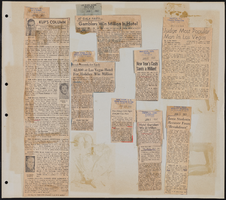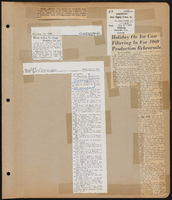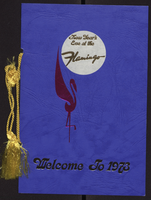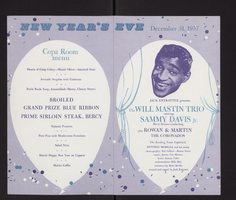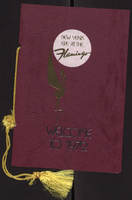Search the Special Collections and Archives Portal
Search Results

Transcript of interview with Charles T. "Blackie" Hunt by Cork Proctor, July 3, 2003
Date
Archival Collection
Description
Charles T. "Blackie" Hunt, born in Pottstown, Pennsylvania in 1930, started accordion lessons at age five. He recounts learning from experienced musicians, then teaching others at age twelve because his teacher was drafted. He attended West Chester State Teachers College where, among other accomplishments, he put together a group with Nick Carlino as tenor sax player. Blackie shares detailed memories of the many musicians with whom he worked and toured. They played in venues that included Harrisburg, Toronto, and Montreal, and eventually were offered a booking at the Sahara Hotel in Las Vegas. The group that Blackie worked with in Las Vegas, Tahoe, and Reno came up with the name "The Characters" (backward 'e'), and the show featured comedy and music. It was during this time that he met Lorraine (stage name Lauri Perry), who had her own group. They were married after a couple of years and Lauri joined The Characters. Blackie and Lorraine Hunt opened Blackie's Bar on Tropicana and Eastern Avenues in the seventies. He talks about the jazz sessions that took place and the musicians who sat in on them, and how he and Lorraine eventually decided to bow out of show business themselves. The Hunts went on to open the Bootlegger, a restaurant/piano bar on Las Vegas Boulevard. They started a little comedy/music session called "Off the Cuff', in which local or touring musicians, comedians, and singers often participate. Blackie and Lorraine have been part of the vibrant history of Las Vegas and the state of Nevada for many years, and continue to make their home here.
Text

Transcript of interview with Steve Riback by Barbara Tabach, December 12, 2017
Date
Archival Collection
Description
Sgt. Steve Riback is a Detective Sergeant for the Las Vegas Metropolitan Police Department. He has been with the police force for nearly twenty years. On the night of the Route 91 Harvest festival shooting, he had just returned home shortly after 10pm. He had been on an overtime assignment at the Golden Knights hockey game at the T-Mobile prior to the shooting. When he was abruptly awaken by a call from his lieutenant, he was oblivious to the time and immediately rushed into action—contacted his squad members and sped to his station in northwest part of the city. He reflects on his overwhelming pride of the police that day, recalling what he heard on his police radio, seeing the rush of police cars being dispatched, and watching a body camera video later. Sgt. Riback’s squad was assigned to Spring Valley Hospital where they worked tirelessly to identify victims, both injured and deceased. His reflections stir the image of medical professionals and police officers urgently fusing together to handle the situation at hand. Riback shares a myriad of emotions, talks about the options available for officers to deal with their personal trauma, and how he explained to his eight-year-old why Daddy was crying. Riback is also known as the Kosher Cop and has authored a book, My Journey Home, about becoming an observant Orthodox Jewish officer and his struggle for the right to wear his beard and a yarmulke while on duty.
Text
Jean Ford Papers
Identifier
Abstract
The Jean Ford Papers (1958-1996) include political documents, campaign materials for Jean Ford's political campaigns, and materials pertaining to campaign issues such as health services, general improvement districts, and parks and recreation. There is extensive material on Red Rock National Conservation Area, Lake Mead National Recreation Area, and the National Issues Forum. Women's issues cover the years 1964-1981 and contain information relating to the League of Women Voters, Equal Rights Amendment (ERA), and International Women's Year (IWY), as well as Anti-ERA and Anti-IWY materials.
Archival Collection

Transcript of interview with Richard Leigon by Stefani Evans and Claytee White, January 12, 2017
Date
Archival Collection
Description
The first part of this Shakespearean quote perfectly describes the deep admiration and love that Richard Leigon has for his father, International Brotherhood of Electrical Workers (IBEW) leader Ralph Leigon. The elder Leigon's major contributions include 39 various positions from the Nevada State American Federation of Labor and Congress of Industrial Organizations (AFL-CIO), Nevada State Democratic Party, and the Southern Nevada Building Trades Council. Richard speaks upon the early years of Las Vegas with the allure of atomic testing, going to school with future community leaders Jerome Mack, Shelley (Levine) Berkeley, and Beth Molasky as well as the role of the union in building Las Vegas. After graduating from Las Vegas High School, he attended Somona State University and obtained a degree in humanistic psychology where he furthered his father’s influence on becoming a ‘we’ person. He came back to Las Vegas to start his 40-year career as an active member of Local 357 as executive
Text

